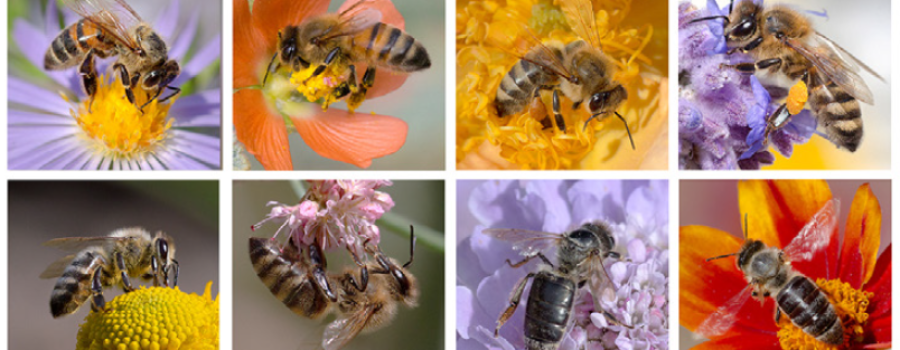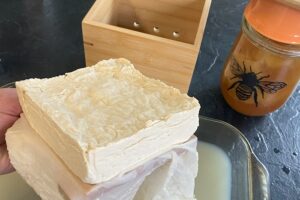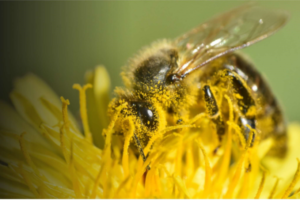Bees provide essential ecosystem services such as pollination critical to the rich diversity of fruits, vegetables, and nuts we so much enjoy on our plates!
We also know that the decline in pollinator populations are of significant concern. Bees, specifically, are facing a suite of challenges that have been linked to their population decline including: poor nutrition, pesticides, pathogens, overwintering and pollination stress, parasites, habitat loss, invasive species, climate change, and more. You may have seen a popular image of your breakfast plate in a world with bees and a world without bees, and the contrast is quite shocking (and how boring, a world without bees would be)!

Breakfast with bees 
Breakfast WITHOUT bees
Now, we’re not going to pretend that the honey bee is our most industrious pollinator or the ‘workhorse’ of pollination service providers because that simply wouldn’t be true. Honey bees are kind of picky and don’t like to fly under as variable conditions as their native North American bee counterparts (shout out to the native bees!). However, honey bees do something very special that we all so very much enjoy and appreciate – and that is not only do they pollinate, but they also produce nature’s gold – HONEY! And we put a lot of thought and effort into reducing some of the stresses mentioned earlier and provide great care to ensure our bees are happy, healthy, and able to produce the best honey possible.

Honey and bees are something very near and dear to our hearts – if you’ve found this blog post then you’ve hopefully noticed our brand ‘Firefly Fields’ is honoring an insect. We LOVE bugs and all the support they offer to the environment. Regardless of where Virginia has lived – Utah, California, Michigan, Indiana – the honey bees have a been constant in her life – providing ‘a taste of place’ and connection to the sky and fields within all the places she has lived. If you ask her, PLACE MATTERS. It’s now been a little over a decade since she started keeping honey bees, but by far the healthiest (longest living, most vigorous, most productive) hives she has ever kept have lived and prospered on the land where she was raised at the Jennings Family Farm in Michigan. This matters because, like all pollinators trying to make living – the honey bee is in trouble.
The Bee Informed Partnership (http://beeinformed.org) recently conducted the twelfth annual survey of managed honey bee colony losses in the United States. Responses to the survey represent 6.6% of the estimated 2.67 million managed honey-producing colonies in the nation (USDA, 2018). For the entire survey period (1 April 2017 – 1 April 2018), beekeepers in the U.S. lost an estimated 40.1% of their managed honey bee colonies. This is 2.7 percentage points greater than the average annual rate of loss experienced by beekeepers since 2010-2011. As we mentioned before, there are a lot of stresses on the bees and we, at Firefly Fields, are dedicated to minimizing the stress factors as beekeepers and land managers – we’re unique in that we have the opportunity to not only manage the hive, but also the expansive landscape the bees thrive on.
These AMAZING insects give so much to the land, plants, and animals – it is our duty to support them as much as we can in this complex world.

Total winter colony loss rate in the United States across years of the Bee Informed Partnership’s National Honey Bee Colony Loss Survey (yellow bars; 1 October – 1 April)1. Total annual loss estimates (orange bars) include total winter and summer (1 April – 1 October) losses; the latter has been estimated since 2010-2011 only. The acceptable winter loss rate (grey bars) is the average percentage of acceptable winter colony loss declared by the survey participants in each year of the survey. Source:
http://beeinformed.org
At Firefly Fields, Saskatraz bees colonize the hives situated on over 450 acres of certified organic farmland. The Saskatraz bees can trace their most recent roots back to Saskatchewan, Canada where they have demonstrated great vigor in the colder north and exhibit exceptional grooming behavior, believed to help with varroa mite tolerance. Culturally, these bees are a great fit for the environment in Michigan. On top of living in a locally-adapted, suitable climate, 3 out of 10 habitat acres each year are dedicated to sweet, organic, nectar and pollen resources. These diverse acres of cover crops, hedgerows, woodlands (with an abundance of fruit, nut, and honey locust trees), and freshwater provide a diet fit for a queen. That diet and flavor, certainly shows-up in Firefly Fields raw honey! #PlaceMatters

People also matter; and the care a keeper gives to the bees impacts the hive directly. To give you an idea (and we know it may sound a little hokey), we practice glove-less beekeeping. It’s something Virginia learned years ago at a honey bee workshop at Washington State University, with Dr. Steven Sheppard (more on beekeeping mentors another time!). Gloves dull the sensation and responsiveness the keeper has to the hive; when you go gloveless, the keeper senses the vibration communication from the bees and is able to move and work the components of the hive with greater ease and precision, which keeps the bees and the beekeeper happier! Our hives stay put on the land, and we naturally, let the bees requeen themselves when they see fit. We have had queens that thrive for up to 3-5 years before losing fertility, in which case, the worker bees begin the process of requeening the hive. There are beekeepers out there that move their hives thousands of miles from location to location to provide pollination services then harvest most of the honey at the end of the season, leaving their bees with sugar water or high fructose corn syrup to supplement nutrition, only to start over the next spring with either a new package of bees or ‘pinching-off’ the queen each season and installing a mail-order queen. We DO NOT do any of these things.
WE LOVE and ADORE our bees, and our motto at the farm is to provide ONLY what the farm can provide each season. We harvest only what our bees can provide, following the ‘Golden Honey Rule.’ We only take what is left after the honeybees have all the resources they need for the over-wintering season. #BeesMatter

Photo credit: Ramon Ramos Torrech
There’s so many, many things we could say about these magnificent creatures, but we’ll save that for future blogs! In the meantime, know that the path of Firefly Fields raw honey is hive-to-jar-to-mouth. So, we never heat or treat our honey products with anything – keeping the ‘Nectar of the Gods just the way the Gods intended!’ We bottle in one-of-a-kind, hand-painted Weck glass with a beautiful honeybee on the jar to make sure the ‘eater’ knows who made that delicious golden treat. We think it honors the efforts and contributions made by these incredible beings.
So to commemorate the holidays, and to salute the real micro-farm workers responsible for the delicious honey gold we enjoy so much – we will be running some holiday deals starting TODAY (December 13 – January 1, ‘the BEST DEAL of 2018’). Feel free to buzz on over and check out the deals while they last. We sell this season’s honey until it runs out!

#OneFarmOneFamily #QualityOVERQuantity #ATasteOfPlace






Leave a Reply
Your email is safe with us.